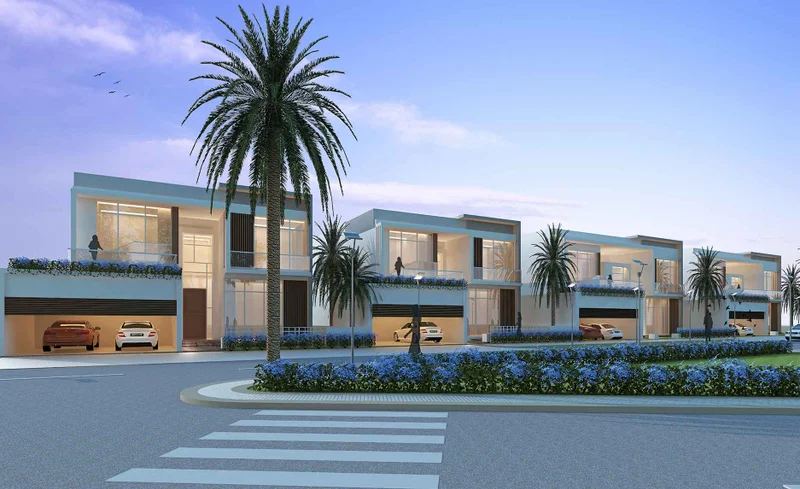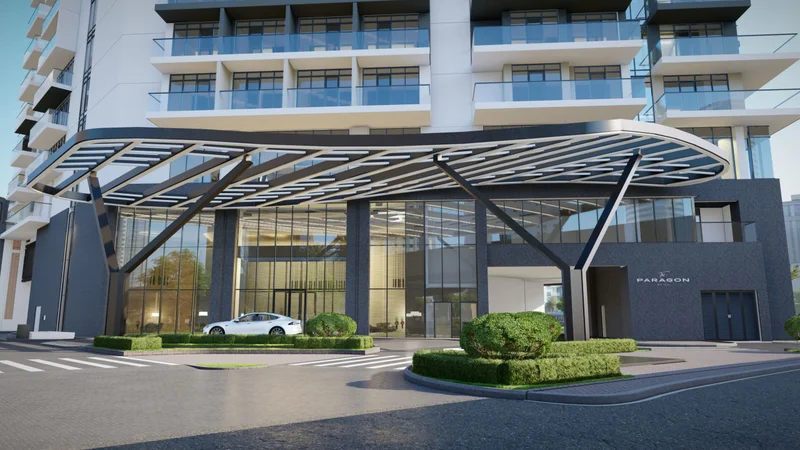Buying property in Dubai in 2025 can be a smooth process with the right preparation. Being informed about the key aspects of property acquisition will help you choose the most profitable option, avoid overpaying, and prevent issues during the transaction.
Frequently Asked Questions
What types of luxury real estate are available in Dubai?
When considering where to buy luxury property in Dubai, it’s important to understand the different types available:
Villas – Spacious, with designer finishes and a cohesive modern concept. Some premium villas offer private beach access, and typically include a pool and landscaped garden.
Townhouses – Large properties, often with multiple floors. Suitable for multiple families with private entrances.
Penthouses – Luxurious apartments located on the top floors of high-rise buildings. They offer panoramic views of the city, open terraces, and high-end finishes.
Apartments – Equipped with premium amenities such as concierge service, panoramic views, and large pools.
What are the best areas to buy luxury property in Dubai?
Top luxury residential areas in Dubai include:
Downtown Dubai – The city’s business and tourist hub, home to iconic landmarks such as the Burj Khalifa, Dubai Opera, and Dubai Mall.
Business Bay – A vibrant business district with offices of major local and international companies.
Palm Jumeirah – A man-made island offering exclusive villas and branded residences with strong long-term investment potential.
Dubai Marina – One of Dubai’s most prestigious areas, featuring over 200 premium residential developments.
Dubailand – A planned urban area known for its theme parks, luxury hotels, and sports complexes.
Arabian Ranches – A serene suburban district with 24/7 security, well-developed infrastructure, and a championship golf course.
Your ideal location depends on your personal preferences and investment goals.
Can foreigners buy property in Dubai?
Yes, foreigners can legally purchase property in Dubai. However, they are limited to Freehold zones — designated areas where foreign nationals have full ownership rights.
Freehold areas include: Downtown, Business Bay, Dubai Marina, Palm Jumeirah, Jumeirah Village Circle, among others.
If the purchase amount exceeds AED 750,000 (~$273,000), the buyer is eligible to apply for a 2-year UAE residency visa.
The entire buying process takes approximately one month and requires minimal documentation.
What taxes and additional costs are involved in buying property?
Buyers should plan for approximately 8% in additional costs, including:
Dubai Land Department (DLD) fee – 4%
Registration fee
Real estate agent commission
DEWA (utilities) connection fee
Mortgage registration fee (if applicable)
Property valuation fee
NOC (No Objection Certificate) issuance fee
Note: There is no income tax in Dubai, even on rental income.
What are the main stages of a real estate transaction in Dubai?
Preliminary Agreement – Signed after selecting a property. Outlines price, responsibilities, and payment terms.
Sales Contract (Form F) – Signed by both parties and includes a deposit (usually 10%). This document is valid for 30 days.
NOC Request – Submitted to the developer to confirm there are no outstanding dues.
Ownership Transfer – Takes place at the DLD. Payment is finalized, and the buyer receives the official Title Deed.
For off-plan properties, a simplified process is used without Form F or NOC, and the deal is registered in a temporary registry.
What documents are required to buy property in Dubai?
For foreigners:
Original passport + copy
Valid visa or entry permit
Proof of Dubai address
Power of attorney (if a representative handles the deal)
Memorandum of Understanding (MoU)
Signed sales agreement (or primary contract for off-plan purchases)
NOC (for resale properties)
For mortgage buyers:
Pre-approval letter from a bank
Proof of income and financial documents
Signed mortgage agreement
What are the visa requirements when buying real estate?
The property owner must meet these conditions:
Be at least 18 years old
Have a legal source of income
No criminal record
Free from serious diseases (e.g., HIV, hepatitis, TB)
Family visas are included and are not dependent on the purchase amount. AED 750,000 investment is sufficient for visas for the entire family.
How can the purchase be financed (mortgage, loan, payment plan)?
Mortgage Financing
Pros: Increases purchasing power, enables portfolio diversification, often with fixed rates.
Cons: Includes closing costs, insurance, and long-term debt obligations.
Developer Payment Plans
Pros: Lower down payment (5–10%), flexible schedules, sometimes discounts.
Cons: Total cost may be higher than paying in full. Risk if the developer fails to deliver.
How to verify the developer and ensure a safe transaction?
Check developer’s license on the DLD website.
Review developer’s portfolio – past projects, timelines, and infrastructure quality.
Assess financial stability – check public reports or official filings.
Request credit ratings – from financial institutions or banks.
Review contract terms carefully (completion dates, guarantees, penalties).
Visit the developer’s office or projects and consult professionals if unsure.
What buyer protections and guarantees are in place?
Only licensed developers can build in Dubai.
Regulated by RERA and DLD, which supervise developers and brokers.
Escrow accounts protect buyers — developers can only access funds upon meeting construction milestones.
In case of developer bankruptcy, funds remain in escrow and can be refunded or redirected to another developer by DLD.
Laws Protecting Buyers:
Law No. 8 (2007) – Escrow protection law for real estate projects.
Administrative Resolution No. 125 (2001) – Construction standards and oversight.
Article 390 of UAE Civil Code – Buyer can seek legal compensation for breach of contract.
Article 248 of UAE Civil Code – Allows modifying unfair contract terms.
These regulations ensure a high level of security and transparency for investors.
Conclusion
Final tips for safe real estate investment in Dubai:
Choose properties in Freehold zones
Verify the developer and project status
Understand all costs and legal procedures
Evaluate mortgage or payment plan options
Ensure documentation and visa eligibility
Work with licensed agents and legal experts
Dubai continues to be one of the most attractive and secure destinations for luxury real estate investment. With the right knowledge and professional support, buying a home here can be both rewarding and profitable.



